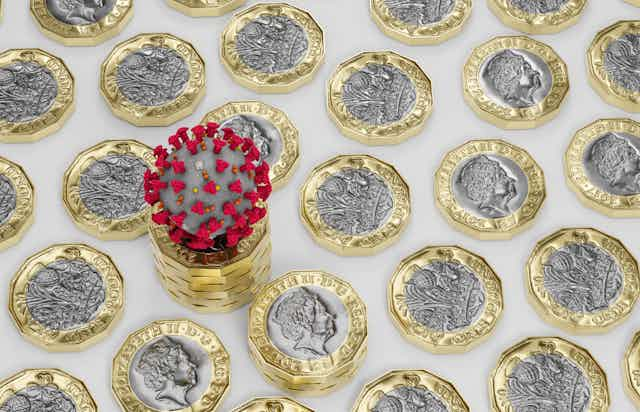COVID has been a painfully expensive ordeal for countries across the world. Aside from the medical cost of vaccines, testing and treatment, economic aid for furlough schemes and sector bailouts dealt a serious blow to public finances.
Nations responded by distributing vast sums of money which are unlikely to be recouped. The UK alone spent £261 billion across different relief schemes, of which £15 billion is expected to be lost due to fraud and errors.
While the government can make a compelling case for the huge sums spent over the course of the pandemic so far, it is worth taking a closer look at where some of the money has gone.
Our research reveals that when it came to financial assistance by the government, some businesses were more likely than others to receive it. These included firms with political connections, and those owned by large and influential shareholders.
We discovered this by looking at a sample of publicly listed UK firms and examining their political connections using a variety of databases. We found that companies with powerful majority shareholders or with political links (a politician member of the board, for example), had a higher likelihood of being bailed out. This suggests that some firms were able to leverage their political capital to gain a competitive advantage.
For its part, the government needed to ensure that recipients of public funds used them for their intended purposes such as continuing to pay suppliers, employees and lenders. This was admittedly a difficult task given all the demands thrown up by the pandemic.
But the fact that so much will be written off in fraudulent claims or other kinds of losses shows a lack of due diligence and monitoring. Our research suggests a further element of crony capitalism whereby public funds were directed towards private interests.
One recent accusation of cronyism was levelled at Greensill Capital, the bankrupt finance company which received access to government emergency COVID loans. Greensill paid the former UK prime minister, David Cameron, a salary of more than $1 million (£767,000) a year for a part-time board role. Cameron said he was not motivated by personal gain, but because he thought the company “had a really good idea for how to help extend credit to thousands of businesses”.
Our research also found that bailouts were often given to firms with high amounts of debt and low cash reserves – businesses which potentially may have gone bust without government support.
After accepting tax payer funds presumably given to help them survive, some then went on to pay generous dividends to their shareholders and bonuses to their directors.

Elsewhere, some companies belonging to large international corporate groups benefited from a publicly funded opportunity to get cheap, short-term loans, while their contribution or commitment to the UK economy was questionable. For instance, BASF, a German chemical group, received the biggest single payout (£1 billion), but has now closed its UK plant and is moving the work to France. BASF has said it will be repaying the loan.
Power to the politicians
The pandemic then, saw the UK government, like others, take on a far more proactive role in financing the business world. It provided vast funds, paid salaries, and spent a fortune trying to fill economic holes.
This form of capitalism, known as “state capitalism”, involves governments assuming the role of an “active economic agent”. It drastically expands the state’s role as promoter, supervisor and owner of capital, with far greater control over the economy.
Other forms of capitalism, characterised by market supremacy and lighter regulation, or a greater input from business, have, for the moment at least, been pushed aside.
As a result, the UK, the fifth largest economy in the world, has a budget deficit rising to its highest ever peacetime level: £323 billion, or 15% of GDP. The pandemic has made the UK’s version of state capitalism far more visible and extensive – bringing far greater economic power (and responsibility) to the people who run the government.

